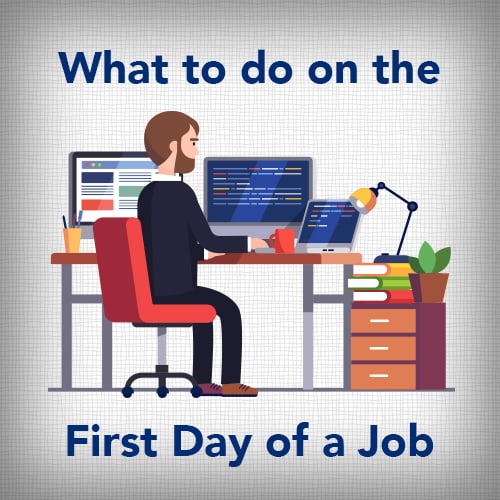Your first day on a new job is inherently one of excitement and pressure. While you’ve surpassed the job searching hurdles—researching companies, writing resumes and cover letters, preparing for interviews, following up with hiring managers—a new set of challenges awaits. It’s time to actually start working the job you’ve been hired to do. You not only want your actions to assure your employers that you were the best candidate, but you want to set goals for yourself as you embark on a career path full of personal and professional development. That’s a tall order for one day of work. Let’s break down a more accessible approach. You’ll see how much of this you already know from going on interviews.
Be early
Same as your interview, show up to work a little early on your first day—ten minutes is fine. There’s so many factors involved with commuting and then parking and remembering the layout of a building you’ve probably only been to once before during an interview that you don’t want to show up to work frazzled or distressed. Set the tone for a productive day by getting to work a little early.
Listen and ask questions
A big part of the first day of work is someone explaining (seemingly) everything about the job to you. It can feel like an information overload. You’re not expected to remember every single thing you’re told on day one, but it doesn’t hurt to carry a notebook and write down relevant information. Further, ask questions. This effectively demonstrates not only how excited you are for your role, but that you’re ready to learn the ropes.
Rework your elevator pitch
You’ll most likely meet a whole lot of people on the first day of work, many of whom will ask what you’ll be doing at the company. Don’t give them your life story. Instead, think of it like the elevator pitch you developed for interviews and networking, only this time you’re letting coworkers know your title and a little bit about how you’ll be contributing at the company.
Observe how things are done
Your boss won’t expect you to have a complete understanding of practices and procedures on day one, but you can start taking note of how things are accomplished around the office. This will help when it comes time for you to participate in any kind of decision-making discussions.
Be social
This involves a couple different strategies. You want to start forming an understanding of your coworkers and teammates. If they invite you to lunch, join them and get to know a little bit about the people you’ll be spending most of your time with. Another aspect of being social is using your gut instinct on who to talk to and who to avoid—does someone start gossiping to you on day one? That’s probably not the person you want to hang around. A large part of day one is understanding the office politics and company culture and how different coworkers fit in with the overall values and how some don’t.
Don’t be too eager
You want to participate in any daily meetings or assignments your team has scheduled, but don’t think that observing and learning the routine means you appear anything but eager. It’s better to move forward with a thorough understanding of how your department operates than volunteer for several projects on day one without that foundational knowledge.
Don’t look at your phone too much
Even if you’re feeling a bit lost on day one, don’t make up for it by distracting yourself on your phone. Instead, ask a coworker if you can shadow them for a little bit as long as it isn’t too disruptive.
Relax and smile, but don’t get too comfortable
There’s a fine balance between not appearing too nervous, but not getting so comfortable that your feet are up on the desk. Smile and make friendly small talk, but don’t get too personal—just like with interviews. You want to be yourself and start to let coworkers see your personality, but don’t tell inappropriate jokes or start talking about politics.
Don’t be too hard on yourself
The first day of a job feels like it will set the tone for your entire career, but that’s simply not true. Your hard work, determination, and motivation make your career. If the first day didn’t go exactly as you imagined, think about what you would to change and work on it. Always try to do your best, but your performance review won’t be based on the outcome of day one. Go back in for day two and give it your best all over again.
You can visit a no-cost Goodwill Career Center and ask a career advisor for assistance with your job search or career questions. Call 602-535-4444 to find a center near you or visit our locations page. Good luck with your job search!
